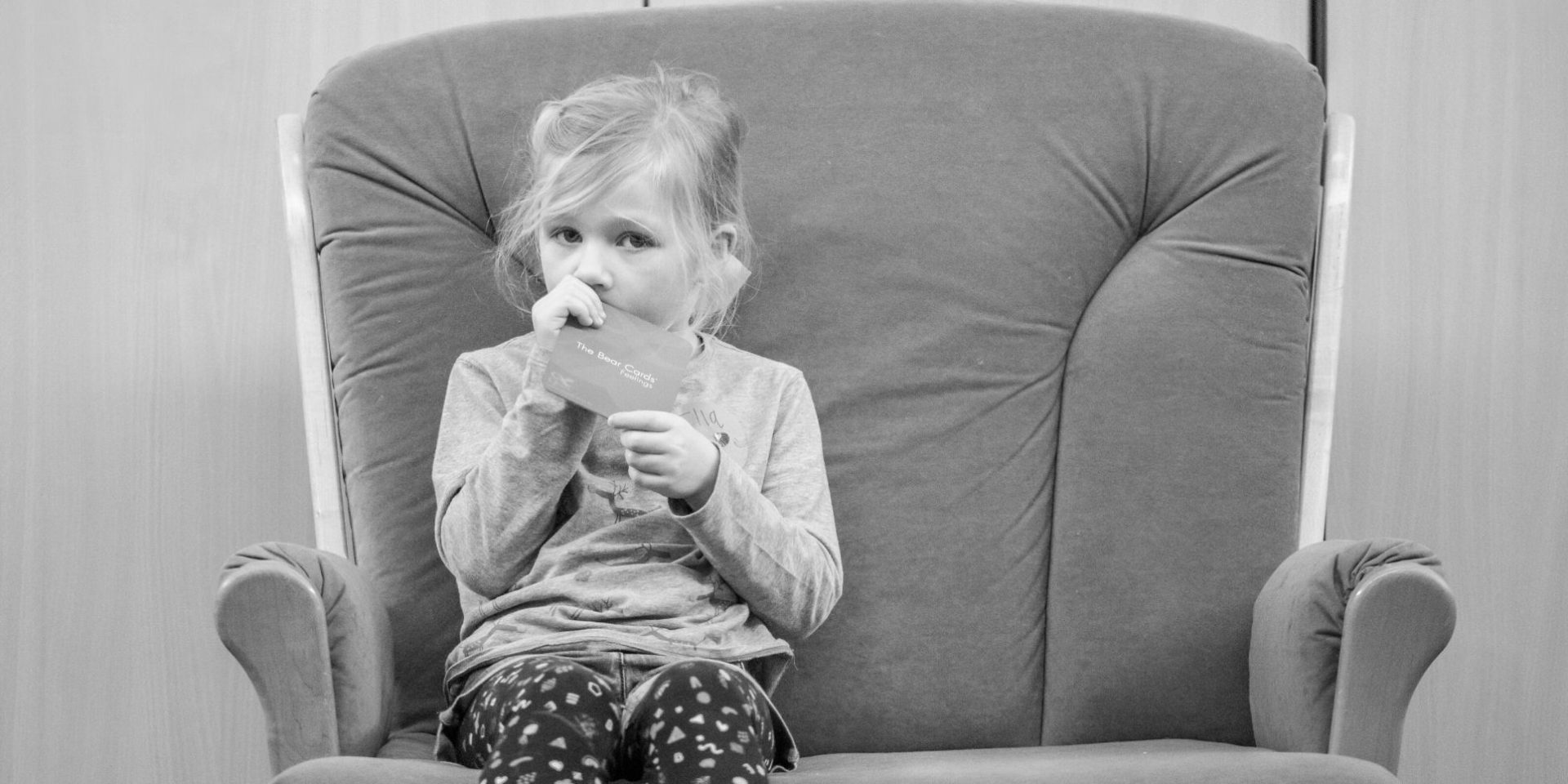Although they will feel it just as deeply, children will experience and express grief in different ways to adults. The way children grieve will mostly depend on their age and understanding of death as well as their ability to talk about their thoughts and feelings.
This can often make their reactions appear quite different in comparison to how adults may express their feelings. Initial reactions to the news of a death may vary greatly from considerable distress, to finding it hard to speak, or they may not react very much at all.
Whilst this can be difficult for adults to understand and to keep up with, it is very normal and it doesn’t mean that your child doesn’t care or isn’t impacted by what has happened. It may take them some time to process what has happened and they might need some help in finding ways to express how it feels for them.
A helpful analogy: rivers and puddle jumping
After someone dies, it is normal to move between intense grieving and times of reprieve and looking to the future, however this oscillating back and forth can happen even more quickly for children.
One useful illustration we use to describe the difference between an adult and a child’s grief is to compare that feeling of being deep in a river with jumping in and out of puddles.
Adults can often feel overwhelmed by grief, as if they are caught in the current of a river and find it hard to get out. Whereas, young children in particular, tend to ‘jump’ in and out of their grief – a little like jumping in and out of a puddle – leaping from feeling very upset and distressed one moment to wanting to know what’s for tea or whether they can play football, for example. The reason for this is that children need a break from the powerful emotions that accompany their grief and so are able to jump out of them for a while in order that they are not overwhelmed.
How can you support grieving children and young people?
Be understanding
It is important to show understanding for both grieving styles, whether you’re in or out of the river or puddle. You should be able to express your grief and children need to be able to express their grief when they need to, as well as to play when they need to.
Express your feelings
Children look to adults to learn how to express their emotions and feelings. So, if you are able to put into words if you’re ‘feeling particularly sad or angry today because you miss Mummy’ then this can help give children the words and permission to do the same.
Although children may initially be upset when they see you cry, it can actually be very helpful for them if you are able to give them an explanation. Something along the lines of ‘there’s nothing you have done that has upset me. I’m crying because I’m sad that Daddy died’. You can further this explanation by saying that ‘these tears and this sadness are already inside me, and it’s really good to let some of them out so that I don’t have to hold it all inside’.
Let them know it’s ok to talk
It can be helpful to let your child know that you are happy to talk with them about ‘Daddy’ whenever they want to and to let your child know if you’ve noticed if they seemed particularly quiet or restless that day, and to check in if they want to talk about the person who has died.
How do children grieve at different ages?
These are some of the different reactions you might see in your child/children after their loss and how much they understand about death at different ages. It is important to note that every child and their grief is unique and that this list is not definitive. Use it as a guide to some of the things you may notice in your child when they experience the death of someone important in their lives.
How do babies react to the death of a loved one?
Children of this age do not understand death but will experience the death as a loss or absence of someone who cared for them. They are likely to respond to the changes in the emotions of people around them, although they will not know why.
Some common reactions include:
- Trouble with sleeping and eating
- Crying, sometimes inconsolably
- Become more withdrawn or more clingy
If possible try to keep to their familiar routines, which will help them feel safe and secure.
What do children aged 2-5 years old understand about death?
Children aged 2-5 years have a limited understanding of the permanence of death. They may see it as reversible. They will often have a very literal understanding of explanations given to them and will make up their own explanations if necessary.
This is why it is particularly important to use words like ‘death’ and ‘dying’ in order to give a clear and factual explanation that your child can understand. Although euphemisms such as ‘gone to the stars/heaven’ or ‘gone to sleep’ may seem kinder, they can lead to a lot of confusion and possible anxiety surrounding sleep, or why Daddy left and went to stay in ‘heaven’ (which may as well be Devon to them) instead of staying with us.
Some common reactions include:
- Increased anger and tantrums – often linked with anxiety
- May be more clingy
- They may become more withdrawn or anxious
- Reverting to behaviours they had when they were younger e.g. bedwetting, thumb sucking
- May ask the same question repeatedly and need reassurance that the death was not their fault
Try to talk to your child regularly about what has happened and answer their questions and keep the person who has died in the conversation. Reassure them that they will be looked after and try to keep to familiar routines and boundaries.
What do children aged 5-10 years old understand about death?
Children of this age are building a greater understanding that death is irreversible and that it will happen to all living things. They may worry that others will die too. They are developing empathy and it is possible they may try and hide their feelings as they might worry how it will impact you.
Some common reactions you may see:
- Children of this age may complain of somatic symptoms such as a sore tummy or headache
- They may retreat into themselves
- Show increased aggression
- Develop a curiosity around death and/or worry that others might die too
- May have growing concerns around feeling different from their peers
Children of this age range may need more support in expressing their feelings. Sometimes activities such as picking out different emojis and asking questions such as ‘when was the last time you felt happy/sad/angry?’ can be a useful way to start conversations, and sharing how you have felt can help with this too.
How do teenagers react to the death of a loved one?
At this age, children and young people are much more aware of the finality of death and are able to understand it in both a concrete and abstract way. They understand what it will mean for them and their lives both now and in the long term.
Peers and friends become increasingly important in this age group. Some people refer to grieving during this age range as being a teenager with the volume turned up as many of the ‘normal’ teenage experiences can become intensified as they navigate their loss in addition to the enormous changes happening within their bodies and at school.
It is also possible that you may see less empathy from your teenager. This can be really difficult as a parent but as emotional development is still ongoing it is not unusual, particularly when in the throes of grief.
Some common reaction you may see:
- Intense feelings of sadness, guilt, anger
- Feeling worse about themselves
- Become withdrawn or finding it difficult to talk about their feelings
- Engage in risk-taking behaviours and test boundaries
- Worries around their own health
- They may start to ask questions around the meaning of life: What’s the point? Why did this happen to them?
What is important is to remain available, but not to push – and to remind them that you’re there if and when they need, as well as to maintain the limits that you would normally have in place.
How does a child’s grief change as they get older?
Feelings of grief may affect children differently at different times in their lives. As children and young people grow they may have different questions or experience different emotions in relation to their developmental stage and understanding of what it means for them. They may revisit their grief on special dates or anniversaries or at significant milestones, such as when they change schools, go to university, get married, or have children of their own. It can sometimes help to be prepared that these days or times might be harder, and to find ways to remember the person who has died and to take extra care of yourselves.
How to get bereavement support
Winston’s Wish provides support to grieving children, young people and their families all over the UK, and we are here for you if you need us. Our Freephone National Helpline can offer guidance, support and information for bereaved families and the professionals caring for them – call 08088 020 021.
You can also email us on ask@winstonswish.org or use our online chat. Our Winston’s Wish Crisis Messenger is available 24/7 for anyone needing urgent support in a crisis. Text WW to 85258.
Other articles you might find helpful
How to help bereaved children understand grief
A simple way to explain grief to children and young people and to help them to understand their feelings.
How to answer difficult questions about bereavement
Children and young people will often have lots of questions after the death of somebody close to them. Here is some advice on how to answer them.




